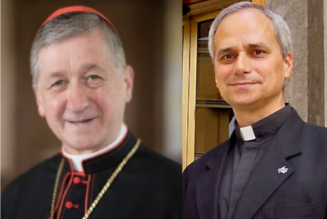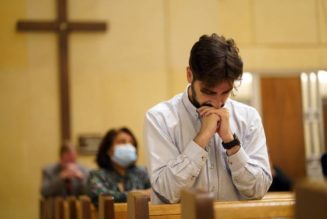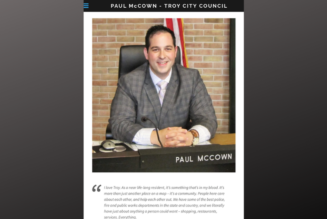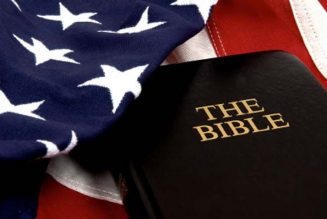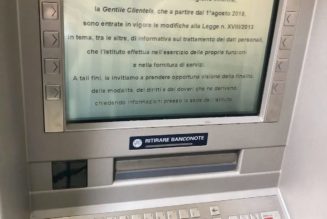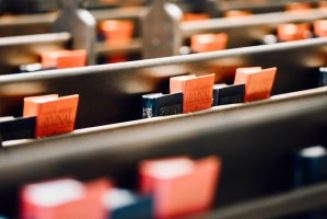
In the Gospel for the Fourth Sunday of Easter, Year A, Jesus Christ says that he is the Good Shepherd who knows his sheep.
In saying so, he is deliberately contrasting himself with the shepherds of his time, the Pharisees. In the idiom of the day, saying “I am the good shepherd” is saying “I am the true shepherd.” When we hear his words 2,000 years later, he is again offering himself as our one shepherd and contrasting himself with the religious proxies for him who fall short.
That we are called sheep in the Gospel is high praise and devastating realism.
The value of sheep in the ancient world was significant. They were the lifeblood of the economy. Nearly everyone’s livelihood was affected by them. They provided milk and wool — and also meat, skins and horns. They were even eternally valuable, supplying the yearly Passover sacrifice.
But sheep, then and now, are clueless. They are easily led and easily lost. As my family visited a farm a few weeks ago, one died in a minor accident. The owners said sheep are like that — they aren’t smart enough and don’t have a survival instinct strong enough to survive without constant oversight and protection.
Their usefulness and their cluelessness make them perfect representations of us. We, too, are highly valuable losers.
Their guardians, shepherds, were also simultaneously vitally important and easily overlooked in ancient times. They ate simple food, worked outside in harsh weather with bad lodging, and had to be on the lookout for dangerous predators — lions, bears, and wolves. They also had to take care to count their sheep often, and look out for the weak ones: Expectant ewes, newborn lambs, and the sick.
So to call pastors, bishops, and popes shepherds is also high praise and significant realism. A good bishop has been put in charge of a flock that is often clueless and in danger. So, a shepherd in the Church should be:
- always on his feet, tiring himself out checking on his flock and attending to its needs;
- always on the watch, careful for whoever and whatever might lead his flock into dangerous sins;
- and always ready to help, finding every opportunity to provide the soul-healing sacraments.
And, thank God, this describes many of our pastors and bishops today. It was refreshing to hear from Francis X. Maier, in a talk at Benedictine College, that he has interviewed hundreds of American priests and bishops and that he was very impressed. He said that the vast majority of our shepherds are good men who are doing their best.
But the shepherds in Christ’s time were not like the ideal, and we all have known pastors and bishops in our time who aren’t either.
Jesus calls himself the Good Shepherd — the true shepherd — right after the story of how some very bad shepherds, the Pharisees, treated the man born blind in the Gospel of John. Those shepherds were self-serving, uncaring, and unbelieving, and interested above all in protecting their own comfort and privilege.
That sounds familiar.
So many people in our time are “born blind,” having no access to the truths of the faith, no understanding of the necessity of the sacraments, and blundering into soul-destroying errors. But so often our shepherds don’t seem to realize what is actually ailing their people, or care to find out or address those things.
There’s an old story about St. John Paul II meeting with American bishops at one of their ad limina meetings. At lunch, the bishop closest him was enthusiastically holding forth on “invincible ignorance.” Invincible ignorance is the name given to those who have no way of knowing Christ, but follow their consciences and seek him as best they can their whole lives.
“Isn’t it true that, even in our modern cities, a soul may be invincibly ignorance and never hear about Christ in an authentic way, and therefore may perhaps still be saved?” the bishop asked.
The pope put down his spoon and all became quiet as he said, “Yes, a soul who has never heard about Christ in our modern cities may be invincibly ignorant and may still be saved,” he said, then added: “But the bishop responsible for that ignorance — he will not be saved.”
Jesus Christ calls himself the true shepherd to assure us that he, at least, stands at the ready to seek and serve.
“I know that you have had some shepherds who let you down,” he is saying. “But do not be afraid. I am at your side.”
He is the New David, a greater version of the shepherd David who said “whenever a lion or bear came to carry off a sheep from the flock, I would chase after it, attack it, and snatch the prey from its mouth. If it attacked me, I would seize it by the throat, strike it, and kill it.” That’s what the standard is for our shepherds; to hurl themselves, with Christ, at whatever would harm their flock.
They also need to speak Christ’s words to their flock, not their own, knowing that “the sheep follow him, because they recognize his voice.” In fact, says St. Augustine, “Not only let him preach the true Christ, but seek Christ’s glory, not his own; for many, by seeking their own glory, have scattered Christ’s sheep, instead of gathering them.”
But for Jesus himself, the standard is infinitely higher. “Amen, Amen, I say to you, I am the gate for the sheep,” he says. Later, he reiterates it, “I am the gate, whoever enters through me will be saved.”
That’s quite a statement. It’s the same kind of language he used for “I am the Bread of Life” and “I am the light of the world.” What does it mean that Jesus is “the gate”?
If he is the sheepgate, then our only way to safety is through him, by him, and in him.
As Vatican II put it in Lumen Gentium, “The Church is a sheepfold whose one and indispensable door is Christ.”
St. Augustine says it works like this: “Christ’s sheepfold is the Catholic Church,” and “Christ the Lord is a low gateway: He who enters by this gateway must humble himself, that he may be able to enter without hitting his head. But he that humbles not, but exalts himself, wishes to climb over the wall; and he that climbs over the wall, is exalted only to fall.”
A shepherd who thinks he knows better than Jesus and can improve on Christ’s enduring truths is no shepherd at all, but a pied piper, trying to lead the sheep astray.
Jesus is both a model and corrective to our pastors and bishops, according to the Second Vatican Council.
The Church “is a flock of which God himself foretold he would be the shepherd and whose sheep, although ruled by human shepherds; are nevertheless continuously led and nourished by Christ Himself, the Good Shepherd and the Prince of the shepherds, who gave his life for the sheep” (Lumen Gentium, 6).
St. Peter, the first chief shepherd, in Sunday’s Second Reading describes how this relationship between the True Shepherd and earthly shepherds works. “He himself bore our sins in his body upon the cross, so that, free from sin, we might live for righteousness,” he says. “By his wounds you have been healed. For you had gone astray like sheep, but you have now returned to the shepherd and guardian of your souls.”
Jesus ends by saying he has come to give us life and give it abundantly. We know what that means, by heart.
Everyone’s favorite Psalm is the Psalm for Good Shepherd Sunday; many of us have memorized, without even trying, its description of abundant life:
“The Lord is my shepherd; I shall not want. … In verdant pastures he gives me repose. … Even though I walk in the dark valley, I fear no evil; for you are at my side. … You spread the table before me in the sight of my foes; you anoint my head with oil; my cup overflows.”
An abundant life isn’t a life full of our own pursuits, but a life where our own pursuits done in God’s company.


